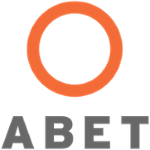Main Content
Program Educational Objectives & Student Outcomes
Accreditation
Our Bachelor of Science (BS) in Biomedical Engineering program is accredited by the Engineering Accreditation Commission (EAC) of ABET, under the commission’s General Criteria and the Program Criteria for Bioengineering, Biomedical and Similarly Named Engineering Programs.The fundamental goal of the undergraduate program in Biomedical Engineering is to offer a high-quality education, designed to achieve the following specific educational objectives and student outcomes:
Program Educational Objectives (PEOs):
Within a few years of graduation, Biomedical Engineering graduates are expected to attain:
- Increasing responsibility beyond that in their entry-level description in job functions within Biomedical Engineering or related employment, and/or
- Successful progress within graduate degree programs in Biomedical Engineering or other professional degrees such as other Engineering, Medicine, Business or Law, and
- Continued successful professional development and adaptation to evolving technologies within their chosen field.
Student Outcomes (SOs):
- Solve: an ability to identify, formulate, and solve complex engineering problems by applying principles of engineering, science, and mathematics
- Design: an ability to apply engineering design to produce solutions that meet specified needs with consideration of public health, safety, and welfare, as well as global, cultural, social, environmental, and economic factors
- Communicate: an ability to communicate effectively with a range of audiences
- Judge: an ability to recognize ethical and professional responsibilities in engineering situations and make informed judgments, which must consider the impact of engineering solutions in global, economic, environmental, and societal contexts
- Cooperate: an ability to function effectively on a team whose members together provide leadership, create a collaborative and inclusive environment, establish goals, plan tasks, and meet objectives
- Experiment: an ability to develop and conduct appropriate experimentation, analyze and interpret data, and use engineering judgment to draw conclusions
- Learn: an ability to acquire and apply new knowledge as needed, using appropriate learning strategies.
Enrollment:
Number of students enrolled in Biomedical Engineering as a 1st major
| Fall 2021 | Fall 2022 | Fall 2023 | Fall 2024 | Fall 2025 |
|---|---|---|---|---|
| 10 (10) | 21 (21) | 20 (20) | 30 (30) | 28 (28) |
( ) shows number of students with Biomedical Engineering as a 1st or 2nd major
| Fall 2021 | Fall 2022 | Fall 2023 | Fall 2024 | Fall 2025 |
|---|---|---|---|---|
| 0 | 0 | 2 | 0 | 8 |
Advanced Courses
The flexibility of the biomedical engineering curriculum allows the students to choose among advanced courses in Bioelectronics and Biosensors, Biomedical Imaging, Biomedical Microelectromechanical Systems, Biomedical Optics, Computational Methods in Biomedical Engineering, Cellular and Molecular Mechanics, Diagnostic Ultrasound, Image Sensors, Kinetics and Kinematics, Medical Instrumentation, Neural Engineering, Neuromodulation, Neural Networks, Optical Imaging and Photonics, Physiological Modeling and Control, and Tissue Engineering.
Technical Areas
Employment opportunities cover the spectrum of Biomedical research and development, software/hardware engineering for bioelectronics and instrumentation, the medical device industry, rehabilitation engineering, manufacturing engineering for the healthcare industry, testing and field servicing of medical equipment, hospital equipment selection and support, technical documentation, sales and consulting, and medical team technical training.




